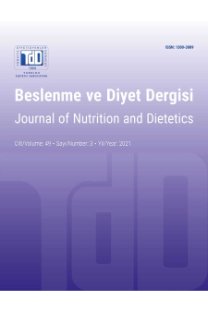Fonksiyonel Gastrointestinal Bozukluklarda Beslenmenin Önemi ve Diyetisyenin Rolü
Fonksiyonel gastrointestinal bozukluklar (FGID-functional gastrointestinal disorders) herhangi bir organik bozukluk olmamasına karşın kronik veya tekrarlayan gastrointestinal semptomlara verilen genel bir addır. Bu bozukluklarda diyetin, hastaya özel olarak hazırlanması ve sürekli izlenmesi çok büyük önem taşımaktadır. Bu süreçte, hastanın beslenme alışkanlıklarının deneyimli diyetisyenler tarafından belirlenmesi ve hasta ile karşılıklı olarak tüm biyo-psiko-sosyal yönler dikkate alınarak incelenmesi, buna göre kişiye özel beslenme ve diyet planının tanzim edilmesi gerekmektedir. FGID’ler arasında en yaygın semptomlar bütünü IBS (Irritable Bowel Syndrome-huzursuz bağırsak sendromu) olarak adlandırılan bozukluktur. IBS’lerde diyetisyenin rolü diğer FGID’lere göre daha da önemli ve özeldir. Türkiye’de diyetisyenlerin bu bozukluklar alanında uzmanlaşması için gerekli adımlar ivedilikle atılmalı ve sağlık kurumlarında diyetisyen kadrosu istihdamı da arttırılmalıdır.
Importance of Nutrition in Functional Gastrointestinal Disorders and the Role of Dietitians
Functional gastrointestinal disorders (FGID) is a general name given to chronic or recurrent gastrointestinal symptoms, although they are not any organic disorders. In these disorders, it is very important to prepare the diet specifically designed for the patient and to monitor the diet continuously. In this process, the patient’s nutritional habits should be determined by experienced dietitians and examined mutually with the patient by considering all bio-psycho-social aspects, and a personalized nutrition and diet plan should be prepared accordingly. The most common set of symptoms among FGIDs is the disorder called IBS (Irritable bowel syndrome). The role of dietitian in IBS is even more specific and important than in other FGIDs. Necessary steps should be taken immediately for dietitians in Turkey to be specialized in these disorders and the employment of dietitians in health institutions should be increased.
___
- 1. Saito Y, Locke GR, Weaver AL, Zinsmeister AR, Talley NJ. Diet and functional gastrointestinal disorders: a population-based case-control study. Am J Gastroenterol. 2005;100(12):2743-8.
- 2. Dennis EA, Dengo AL, Comber DL Flack KD, Savla J, Davy KP, et al. Water consumption increases weight loss during a hypocaloric diet intervention in middle-aged and older adults. Obesity (Silver Spring). 2010;18(2):300- 7.
- 3. Chang L, Adeyemo M, Karagiannidis I, Videlock EJ, Bowe C, Shih W, et al. Serum and colonic mucosal immune markers in irritable bowel syndrome. Am J Gastroenterol. 2012;107:262-72.
- 4. Foxx-Orenstein A, Chey WD. Manipulation of the gut microbiota as a novel treatment strategy for gastrointestinal disorders. Am J Gastroenterol. 2012;1:41-6.
- 5. Chey WD. The role of food in the functional gastrointestinal disorders: introduction to a maucript reises. Am J Gastroenterol. 2013;108(5):694-7.
- 6. Hills RD, Ponterfract BA, Mishcon HR; Black CA, Sutton SC, Theberge CR. Gut Microbiome: Profound implications for diet and disease, Nutrients. 2019;11(7):1613-24.
- 7. Bellini M, Tonarelli S, Nagy AG, Pancetti A, Costa F, Ricchiuti A. Low FODMAP diet: Evidence, doubts and hopes. Nutrients. 2020;4:12(1):148-56.
- 8. Neary E. How dietitians are helping to reduce gastroenterology waiting lists. The medical independent. May 5, 2021. http://www.medicalindependent.ie/howdietitians- are-helping-to-reduce-gastroenterologywaiting- lists Erişim Tarihi 20 Aralık 2021.
- ISSN: 1300-3089
- Yayın Aralığı: Yılda 3 Sayı
- Başlangıç: 1972
- Yayıncı: Türkiye Diyestisyenler Derneği
Sayıdaki Diğer Makaleler
Türkan Kutluay Merdol, Dilek Aslan, Z. Begüm Kalyoncu Atasoy, Şeniz Ilgaz
Mustafa Volkan YILMAZ, Özlem Özpak Akkuş, Esma Asil
Mevlüde Kızıl, Damla Gümüş, Sümeyra Sevim, Gülsüm Gizem Topal
Multipl Sklerozlu Hastalarda Güncel Diyet Yaklaşımları
Polikistik Over Sendromu, Obezite ve Melatonin: Etiyolojik Bakış Açısı
Makbule Gezmen Karadağ, Büşra Başar Gökcen
Perim F. Türker, Handan Öğretir
Kronik Hastalıklarda İnflamasyonun Rolü, Omega-3 Yağ Asitleri ve Epigenetik Yolaklar
Fonksiyonel Gastrointestinal Bozukluklarda Beslenmenin Önemi ve Diyetisyenin Rolü
Çocuklar ve Aileleri için Yeme Farkındalığı Müdahale Programı’nın Türk Kültürüne Uyarlama Çalışması
